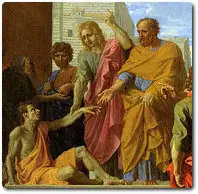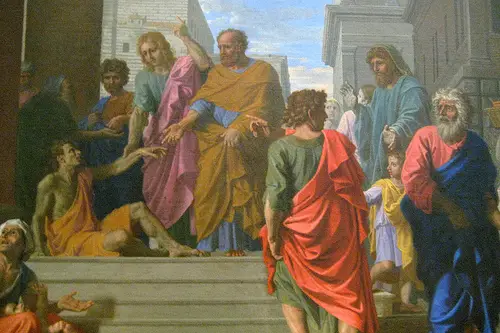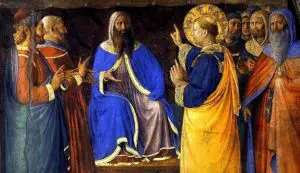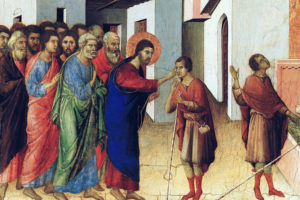Although the importance of Peter’s ministry in the eyes of the modern day Christian is often eclipsed by that of the apostle Paul, this fisherman turned apostle, offers believers keen insight and instruction about God and His Messiah. Not only did God give Peter an unambiguous revelation as to Jesus’ identity, but he was also anointed with the Holy Spirit to preach the gospel at the Church’s inauguration. Thereafter, he continued to play a key role in the direction and edification of the early Church.[1]
It is critical, therefore, that we know who this disciple from Capernaum believed Jesus to be. Was Jesus a man, God, or both? Peter’s sermons, as recorded by Luke in the Book of Acts, give us a clear picture of what he believed and taught about Jesus. Let’s explore the second of Peter’s sermons to find out more about his Christology.
Peter’s Christology
Sometime after the birth of the Church, Peter and John encountered a lame man at the temple gate that was called Beautiful:
Acts 3:3-10 (NASB) When he saw Peter and John about to go into the temple, he began asking to receive alms. 4 But Peter, along with John, fixed his gaze on him and said, “Look at us!” 5 And he began to give them his attention, expecting to receive something from them. 6 But Peter said, “I do not possess silver and gold, but what I do have I give to you: In the name of Jesus Christ the Nazarene—walk!” 7 And seizing him by the right hand, he raised him up; and immediately his feet and his ankles were strengthened. 8 With a leap he stood upright and began to walk; and he entered the temple with them, walking and leaping and praising God. 9And all the people saw him walking and praising God 10 and they were taking note of him as being the one who used to sit at the Beautiful Gate of the temple to beg alms, and they were filled with wonder and amazement at what had happened to him. (emphasis added)
Jesus the Nazarene is the Christ
 If Jesus is God, we would reasonably expect Peter to communicate this vital truth by healing the lame man in the name of the God-Man enthroned in heaven. After all, the miracle was a vehicle to declare the reality of Jesus. But what should stand out to the careful reader, is that instead of declaring him healed in the name of God the Son, or God, the second member of the Trinity, or some other post-Biblical appellation, we find that the miracle was performed in the name of the man from Nazareth who is the Christ.
If Jesus is God, we would reasonably expect Peter to communicate this vital truth by healing the lame man in the name of the God-Man enthroned in heaven. After all, the miracle was a vehicle to declare the reality of Jesus. But what should stand out to the careful reader, is that instead of declaring him healed in the name of God the Son, or God, the second member of the Trinity, or some other post-Biblical appellation, we find that the miracle was performed in the name of the man from Nazareth who is the Christ.
Peter’s next statement offers clarification for the reader who might claim that when the crowd began “praising God” for the miracle, they were referring to Jesus:
Acts 3:10-13 (NASB) 11 While he was clinging to Peter and John, all the people ran together to them at the so-called portico of Solomon, full of amazement. 12 But when Peter saw this, he replied to the people, “Men of Israel, why are you amazed at this, or why do you gaze at us, as if by our own power or piety we had made him walk? 13 “The God of Abraham, Isaac and Jacob, the God of our fathers, has glorified His servant Jesus, the one whom you delivered and disowned in the presence of Pilate, when he had decided to release Him. (emphasis added)
Peter clearly identifies God as the God of the patriarchs, the God of Abraham, Isaac, and Jacob. This was the God the crowd was praising. Jesus, on the other hand, is identified by Peter as the servant of this God. If ever there was a time to tell the monotheistic Jews who had gathered at the temple that their God was actually a triune being, or that Jesus was also God, this would have been it. But Peter can only offer the revelation that has been given to him by God, [2] that this man from Nazareth is the Christ and the servant of God.
Prince of Life
Peter continues his sermon by recounting the tragedy-turned-triumph of the cross:
Acts 3:14-16 (NASB) “But you disowned the Holy and Righteous One and asked for a murderer to be granted to you, 15 but put to death the Prince of life, the one whom God raised from the dead, a fact to which we are witnesses. 16 “And on the basis of faith in His name, it is the name of Jesus which has strengthened this man whom you see and know; and the faith which comes through Him has given him this perfect health in the presence of you all. (emphasis added)
Some might argue that Prince of life, or Author of life as some translations render it, is a reference to the Trinitarian view that Jesus is the Creator.[3] However, this is not the case. The word prince in the Greek is archêgos, and it means founder, leader, author, prince. It appears four times in the New Testament, each with regard to Jesus, and it never means Creator.[4] Rather, it is always a reference to the fact that Jesus is the means by which we are saved, having been given the authority by God to extend eternal life to those who believe and obey him as the Christ.[5] Jesus said that this life was given to him by God:
John 5:26 (NASB) “For just as the Father has life in Himself, even so He gave to the Son also to have life in Himself; (emphasis added)
Jesus further testifies that he lives, not because he is inherently immortal as deity, but because the Father has given him life. A contradictory statement if you are the co-equal, co-eternal member of a triune being:
John 6:57 (NASB) “As the living Father sent Me, and I live because of the Father, so he who eats Me, he also will live because of Me. (emphasis added)
This same life is now available to all who believe in Jesus, the Prince or leader of this new life. And this is the point Peter is developing in his sermon.
Suffering Servant of God
 Peter now connects Jesus, who was crucified and raised from the dead, to Old Testament prophecies that the Messiah would suffer:
Peter now connects Jesus, who was crucified and raised from the dead, to Old Testament prophecies that the Messiah would suffer:
Acts 3:17-18 (NASB) “And now, brethren, I know that you acted in ignorance, just as your rulers did also. 18 “But the things which God announced beforehand by the mouth of all the prophets, that His Christ would suffer, He has thus fulfilled. (emphasis added)
Note that Peter distinguishes, yet again, between God and Jesus by saying that Jesus is His Christ, that is, the Christ of God that was destined to suffer. Indeed, Isaiah, in his famous prophecy, identifies the Messiah, not as the suffering God, but as the suffering servant of God.
Isaiah 53:11 (NASB) As a result of the anguish of His soul, He will see it and be satisfied; By His knowledge the Righteous One, My Servant, will justify the many, As He will bear their iniquities. (emphasis added)
Prophet of God
In addition to being the servant of God, Peter identifies Jesus as the promised prophet of God:
Acts 3:19-22 (NASB) “Therefore repent and return, so that your sins may be wiped away, in order that times of refreshing may come from the presence of the Lord; 20 and that He [God] may send Jesus, the Christ appointed for you, 21 whom heaven must receive until the period of restoration of all things about which God spoke by the mouth of His holy prophets from ancient time. 22 “Moses said, ‘THE LORD GOD WILL RAISE UP FOR YOU A PROPHET LIKE ME FROM YOUR BRETHREN; TO HIM YOU SHALL GIVE HEED to everything He says to you. (emphasis added)
A prophet is one who has been called and anointed by God to speak a message on God’s behalf.[6] Peter declares that God raised up His servant Jesus and appointed him to be His spokesman, just like He did Moses. If Jesus is God, he cannot be his own prophet. To say that he is both is to defy the meaning of the terms. Peter did not preach that Jesus is God, but he did preach that Jesus is God’s prophet.
Peter uses Jesus’ calling as God’s prophet to motivate his audience to repent and to return to God so that their sins may be forgiven and the presence of the Lord restored. This admonition comes with a heavy warning: those who refuse to listen to God’s prophet will be destroyed.
Acts 3:23-25 (NASB) ‘And it will be that every soul that does not heed that prophet shall be utterly destroyed from among the people.’ 24 “And likewise, all the prophets who have spoken, from Samuel and his successors onward, also announced these days. 25 “It is you who are the sons of the prophets and of the covenant which God made with your fathers, saying to Abraham, ‘AND IN YOUR SEED ALL THE FAMILIES OF THE EARTH SHALL BE BLESSED.’ 26 “For you first, God raised up His Servant and sent Him to bless you by turning every one of you from your wicked ways.” (emphasis added)
This is the second time in this short sermon that Peter refers to Jesus as the servant of God. Strong’s Concordance explains that servant in the Greek is pais, and in this context it means “a male slave, servant; thus: a servant of God, especially as a title of the Messiah.“[7] Indeed, Jesus, the man from Nazareth, is God’s servant, the Messiah (Christ), and the promised prophet. This is how Peter identified Jesus when he preached at the Beautiful Gate. Contrary to what many Christians assume, Peter did not preach that Jesus was God. It is time for the Church to preach the same message that the apostle Peter preached.
Acts 2:42 (NASB) They were continually devoting themselves to the apostles’ teaching and to fellowship, to the breaking of bread and to prayer. (emphasis added)
Selah.
Next, read about Peter’s third sermon: Peter’s Christology Before the Sanhedrin
[1] Matthew 16:15-20; Acts 2:1-47; 15:6-12.
[2] Matthew 16:15-20 (Mark 8:29-30; Luke 9:20).
[3] Colossians 1:15-18; Hebrews 1:1-2.
[4] Acts 3:15; 5;31; Hebrews 2:10; 12:2.
[5] John 5:25-26; 11:25; 17:1-3; 20:31; Acts 4:12; Hebrews 5:9.
[6] Merrill F. Unger, “Prophet,” in Unger’s Bible Dictionary, (Chicago: Moody Press, 1975), p. 890.
[7] Strongs #3816, pais, https://biblehub.com/greek/3816.htm




Another wonderful presentation of the truth – thank you!
Thanks so much, Chuck! I so appreciate your encouragement.
God bless!